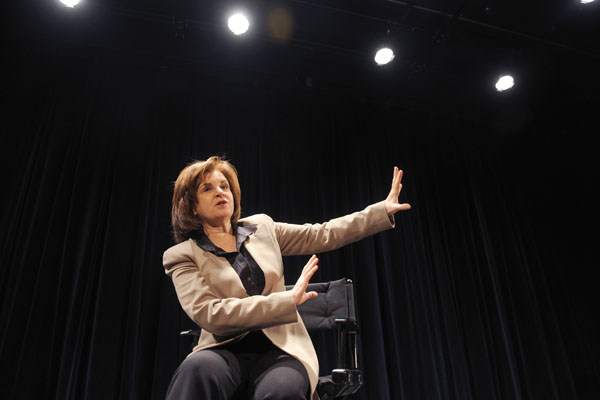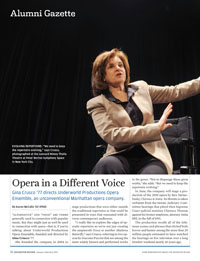Alumni Gazette
 EVOLVING REPERTOIRE: “We need to keep the repertoire evolving,” says Crusco, photographed at the Leonard Nimoy Thalia Theatre at Peter Norton Symphony Space in New York City. (Photo: Diane Bondareff/AP Images for Rochester Review)
EVOLVING REPERTOIRE: “We need to keep the repertoire evolving,” says Crusco, photographed at the Leonard Nimoy Thalia Theatre at Peter Norton Symphony Space in New York City. (Photo: Diane Bondareff/AP Images for Rochester Review)“Alternative” and “indie” are terms generally used in connection with popular music. But they might just as well be used in connection with opera—that is, if you’re talking about Underworld Productions Opera Ensemble, founded and directed by Gina Crusco ’77.
She founded the company in 2004 to stage productions that were either outside the traditional repertoire or that could be presented in ways that resonated with diverse contemporary audiences.
“I really like to explore the edges of operatic repertoire so we’re not just creating the umpteenth Tosca or another Madama Butterfly,” says Crusco, referring to two operas by Giacomo Puccini that are among the most widely known and performed works in the genre. “Not to disparage those great works,” she adds. “But we need to keep the repertoire evolving.”
In June, the company will stage a production of the 2010 opera by Ben Yarmolinsky, Clarence & Anita. Its libretto is taken verbatim from the Senate Judiciary Committee hearings that pitted then Supreme Court judicial nominee Clarence Thomas against his former employee, attorney Anita Hill, in the fall of 1991. The production recalls all of the infamous scenes and phrases that elicited both horror and humor among the more than 20 million people estimated to have watched the hearings on live television over a long October weekend nearly 20 years ago.
After giving some thought to her directorial concept, she hired a trapeze dance company, Fly by Night, to choreograph the production. “At first I had this idea of staging Clarence & Anita not in a Senate chamber at all, but in a circus, complete with trapeze artists and tight-rope walkers and fire-eaters,” says Crusco. And although she’s modified that concept somewhat—“It won’t be a full-blown circus,” she says—there will be “a hint of a circus” that “reflects the tenor of what’s being said.”
In 2009, Crusco staged a production of Mozart’s Così fan tutte—which she retitled Così fan tutte: Defining Women—in which audience members were invited to vote at intermission, via a text message, “for which character should marry whom in the opera’s final scene.” As for ground rules, Crusco noted in the program that the opera would take place not in 18th-century Italy, but instead in 21st-century Massachusetts, “where nuptials between any combination of three men and three women would be legal.”
“I really felt that Così fan tutte, with its indeterminate ending, just invites that kind of response,” Crusco says. “The audience would be responding in their own way anyway. “To actually solicit that from them was a different way of creating a dramatic outcome rather than a directorial top-down stamp on the opera.”
Arts critics had a ball with her concept. “Bring Your Cell Phone to the Opera, Please,” was the headline on the New York Times blog ArtsBeat. But not everyone was amused. New York Post gossip columnist Paula Froelich called Crusco’s approach “a move that purists will pray never comes to the Met.”
Crusco says that although the production “raised lots of hackles and lots of eyebrows,” “it got a wonderful audience response,” as well as a mention in Musical America’s 2010 “Year In Music,” a summary of groundbreaking musical events from the previous year.
Indeed, says Crusco, “Even ‘indies’ need to be acknowledged by the cultural arbiters.” Serving on either the board of directors or the advisory board of the company are faculty from the Juilliard School and the Manhattan School of Music, as well as tenor Marcello Giordani. And Crusco, who spent nine years on the voice faculty of the New School University, has sustained the company with grants won from a variety of New York City arts organizations.
A philosophy major on the River Campus who also took voice lessons at the Eastman School, Crusco says much of her inspiration came from the two operatic seasons she spent in the 1980s in Spoleto, Italy, where she was a chorus master. She says she was impressed by the small-scale, intimate nature of many productions in Europe.
“I began to see how opera could have a real human scale, how it could draw the audience into the characters’ inner lives,” she says.
“It doesn’t have to be about the grand spectacle. If it has a kind of immediacy to it, opera can reach people where they live.”

